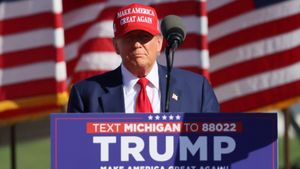With Donald Trump securing the presidency once again, the air was thick with mixed sentiments across New York. On Wednesday, key officials gathered to outline their strategies aimed at safeguarding the rights of New Yorkers during what some see as tumultuous times under the incoming administration. Amongst those voicing their commitments were New York Attorney General Letitia James, Governor Kathy Hochul, and Mayor Eric Adams who collectively sought to quell concerns about potential risks to civil liberties.
AG James, standing alongside Hochul, declared, "My office has been preparing for a potential second Trump Administration, and I am ready to do everything I can to make sure our state and nation do not go backwards." Their statements made it crystal clear – New York would not take threats to reproductive rights, immigration, and environmental protections lightly.
Under the newly established Empire State Freedom Initiative, officials have set plans to bolster legal defenses against potential federal overreach. This task force, brought together even before the election, aims to monitor and counteract any policies they deem harmful, especially those involving civil rights, reproductive healthcare, and gun safety. "We are making sure New York remains a beacon of freedom, and part of our strategy is to hire additional staff to prepare for legal battles," Hochul noted.
Meanwhile, at another press conference, Mayor Adams emphasized the city's unyielding commitment to protecting its residents. "No matter who the President is, we will always stand up for the rights of women, immigrants, and the LGBTQ+ community," he stated. He expressed confidence, assuring New Yorkers, including those from other places who come seeking healthcare, "that abortion care will always be available here. No matter what happens across the country, we’ll be ready to serve those who need us the most."
Adams' comments were particularly heartening for residents concerned about mass deportation – a promise Trump has repeated throughout his campaign. The Mayor assured listeners, "I am committed to developing a realistic and compassionate national strategy for our immigration system." He suggested working constructively with the new administration to develop pathways for asylum seekers, calling for Congress to expedite work authorization processes for those already on U.S. soil.
Adding to the conversation, Manuel Castro, the commissioner of Immigrant Affairs, reiterated the city's supportive stance toward immigrants. "The city's approach to protecting its residents remains steadfast," he said, indicating the administration's promise not to cooperate with federal directives aimed at mass deportations. Castro urged all individuals not to hide but to fully utilize city services, including emergency ones like hospitals and police.
Deputy Mayor of Housing Resilience, Jessica Torres-Springer, remarked on maintaining federal funding streams for significant city projects. With federal funding accounting for approximately $8 billion of the city's projected $112 billion budget for 2025, her office will be working tirelessly to secure these funds, no matter the administration's shift.
The overarching message from New York’s top officials is clear: they are poised to resist any federal actions they believe threaten the very fabric of New York values. They aim to steer clear of adversity, using the existing legal frameworks and community support to safeguard freedoms proactively. While they acknowledge the challenges lying before them, their resolve is unshakeable. New York intends to weather the political turbulence, not just for its residents but also for those who look to the city as a refuge.
This preparation serves as more than just reassurance for New Yorkers. It reflects the broader sentiment of resistance among many Democratic leaders facing the prospect of another Trump presidency. Such discussions are not merely theoretical within the walls of city hall; they resonate deeply within the community, drawing attention from citizens eager to understand how local policies will adapt under new federal guidelines.
The city officials emphasized their collaborative efforts to safeguard immigrant rights, reproductive health, and civil liberties. They project confidence even as they brace for what lies ahead, creating strategies to both uphold New York’s progressive values and fend off potential federal challenges.
Looking forward, residents can expect the city to continue facilitating open discussions about these pressing issues. Officials encourage New Yorkers from all backgrounds to voice their concerns and become engaged with the changes happening at local and federal levels.



